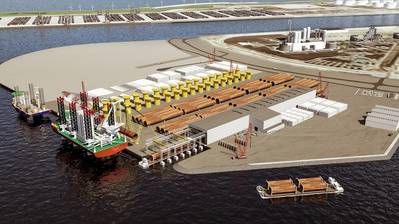Sif and Verbrugge to build terminal for offshore wind energy on Maasvlakte 2
Sif Group, Verbrugge International and the Port of Rotterdam Authority have signed an agreement in principle for the construction of a production and storage/handling terminal in Rotterdam. Sif Group and Verbrugge are planning to set up a joint venture to bring the storage and logistics of the foundations, so-called monopiles, under one roof. At the terminal, which covers around 42 hectares, Sif Group will produce steel foundations for offshore wind farms and the oil and gas industry. It is the market leader in the production of monopiles for the offshore wind market in the North Sea. Verbrugge will take care of the logistics at the terminal, as well as the handling of sea-going vessels. Verbrugge is one of the largest terminals/ logistics companies in Vlissingen, Terneuzen and Zeebrugge and, by taking this step towards Rotterdam, is further expanding its portfolio.
“By combining production as well as handling and storage services for heavy cargo, Rotterdam will gain a strong position in offshore wind energy with top players in their respective markets,” according to Allard Castelein, CEO at the Port of Rotterdam Authority.
“This location on Maasvlakte 2 fits in perfectly with our profile for further expansion of Sif Group at a deepsea port. The strategically good location means that we can provide our clients with optimum service and further strengthen our leading position in foundations for offshore wind and Oil&Gas in the North Sea,” said Jan Bruggenthijs, Sif Group CEO.
Martin Verbrugge, CEO of Verbrugge International, commented, "We have built up an excellent track record in offshore wind projects in recent years. We are ready to take the next step: to professionalize and optimize our service. In Sif Group, as market leader in the field of foundations, we have found a fantastic partner to further extend our ambitions in the market. The fact that this is now possible at one of the most wonderful locations in a world-class port only makes us more ambitious.”
The Port Authority said it expects the terminal to begin operation in mid-2016, adding it will contribute toward the transition to renewable ways of generating energy as Sif Group and Verbrugge will put Rotterdam’s offshore cluster more firmly on the map as a location and supplier for the offshore wind industry. The operations will strengthen the existing offshore cluster by generating extra activities, such as the supply of components, assembly and handling. For loading the components and steel foundations, crane capacity will be installed on shore for high tonnages.
In addition to this, the new plant and the new terminal will create around 200 jobs. The Port Authority will build a 400-meter deepsea quay for Sif Group and Verbrugge, with a depth of -16.50m NAP, with the possibility to deepen it further to approx. -19m NAP.
Until now, the port of Rotterdam has never played a directly visible role in the construction of offshore wind farms, because there was no suitable land available on deep water. Maasvlakte 2 provides this. In the coming years, the Dutch government will be putting a lot of effort into expanding offshore wind farms. The port of Rotterdam, with Sif Group and Verbrugge, will contribute directly towards achieving the goals set in the Energy Accord in the field of offshore wind to reduce the cost of energy. This market is also developing quickly in such countries as Great Britain, Germany, Belgium and France. This is expected to result in substantial growth in offshore wind farms in the coming years.
The Sif Group/Verbrugge plant and terminal will occupy about half of the 80 hectare or so plot on Maasvlakte 2 to the north of the FutureLand information centre. A biobased cluster is also planned for this site. However, the market for this is not developing so quickly that the whole site needs to be reserved. Furthermore, biochemical parties also seem willing to link up, where possible, with existing companies in the port, in the form of co-siting. The Port Authority’s biobased ambitions therefore remain unchanged.











